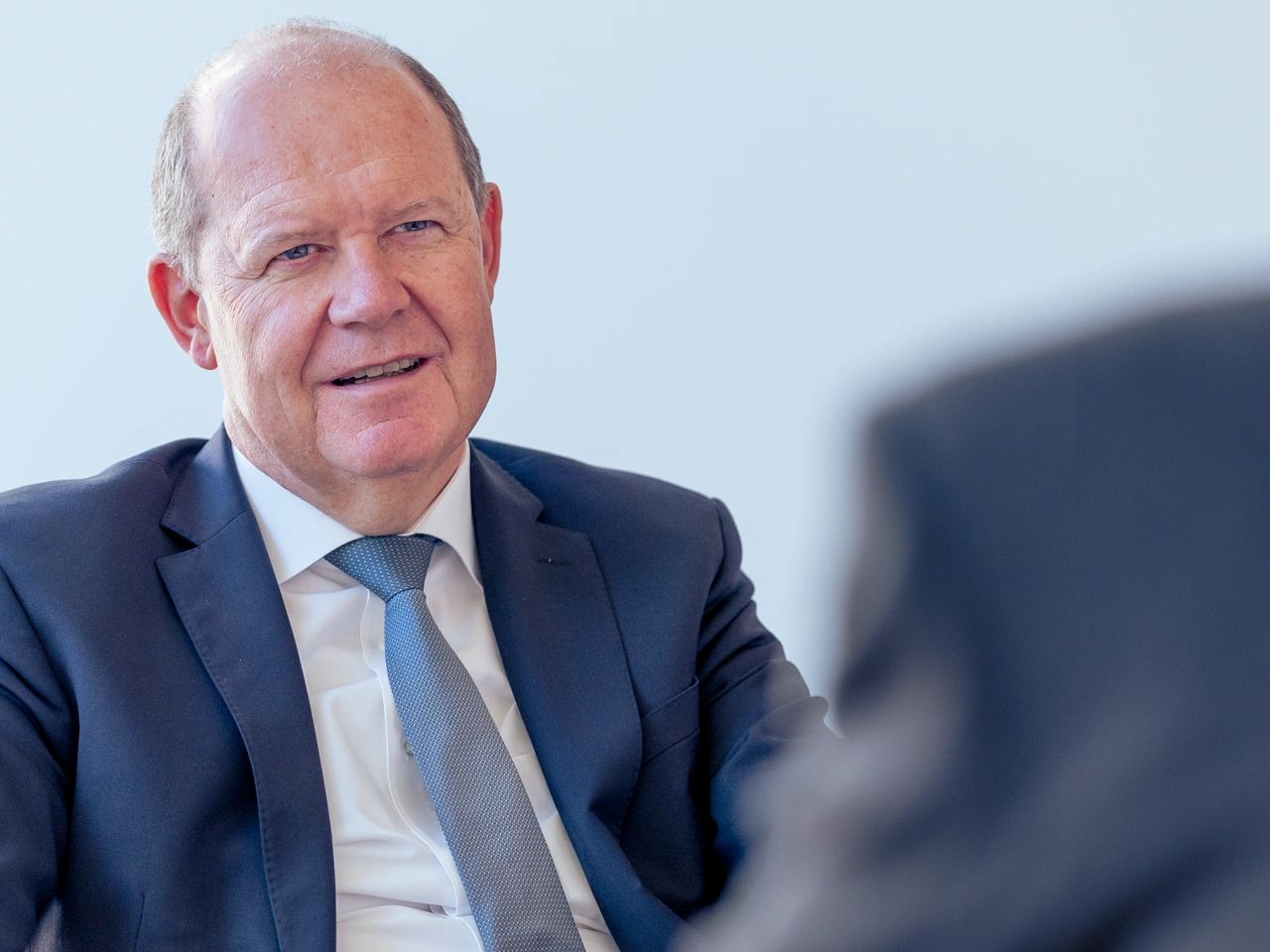Home > Company > Publications > Valentin Vogt
Entering the post-pandemic era: quo vadis Swiss industry?
Swiss industry fared surprisingly well during the pandemic: first and foremost the manufacturers of medical technology, which grew thanks to the high demand for medtech products resulting from the crisis. But the MEM industries and other sectors are also looking to the future with renewed confidence after turbulent phases between fear and hope. Yet despite the upturn, there is no question of a return to business as usual.
Raw material and energy prices are soaring, there are still bottlenecks in the supply chains, and trade conflicts at the global level are becoming increasingly acute. Added to this are Switzerland’s – at least partly – home-made problems, such as the unresolved relationship with the EU, the threat of energy supply collapse in the medium term, or the acute shortage of skilled workers. What do these challenges mean for Swiss industry?
Valentin Vogt, President of the Swiss Employers’ Association, gives his assessment of the situation in an interview with Daniel Bachofen.
Daniel Bachofen: How is the Swiss export industry doing?
Valentin Vogt: Good to very good at the moment. The 2021 financial statements of the companies I am involved with point to excellent results. I am fundamentally positive about the prospects for 2022. The big question is what will happen in 2023.
DB: How do you assess the situation with supply chains and the associated uncertainties in procurement?
VV: We will probably have to live with the procurement problems for electronic components for a while yet. In the case of materials, the problems in the supply chains are temporary in my view: Processors order one and a half times the quantity they actually need. They then receive only a fraction of that and subsequently order three times as much …
DB: … which leads to an increase in prices.
VV: Exactly. Companies can get into a dangerous spiral that causes a new problem: Ongoing over-ordering leads to overpriced inventories that later have to be written off again.
DB: Do you know of any companies that have had to stop production because they didn’t get the components they needed?
VV: I know of one supplier to the automotive industry that had to switch back to short-time work in March 2021 because of procurement problems. However, most industrial companies in Switzerland are able to manage supply bottlenecks dynamically. Furthermore, I expect that we will be able to put the procurement problems behind us for the most part this summer.
DB: Have the companies you are involved with given any thought to realigning their supply chains? I’m thinking, for example, of double sourcing, partial insourcing, or switching to suppliers on other continents.
VV: In various companies, people have once again become aware of what it means when important components are not available. Fundamental discussions have been held and thought processes have been set in motion. Scenarios have been developed for strategic procurement and procedures defined. Now, as after every crisis, it is a matter of implementing the necessary measures and not waiting until the next crisis comes along.
DB: We notice that our customers tend not to want single sourcing any more. Or that they are designing components in-house if the costs are justifiable.
VV: The experiences from the pandemic have certainly raised awareness of the dependence of production on procurement. Especially among companies that no longer keep their own warehouses. Their number has decreased significantly in recent months.
DB: The trade war between the US and China could lead to different standards for the two markets and companies would have to produce different products accordingly. That would be the worst-case scenario, worse than trade barriers or tariffs.
VV: The situation has indeed become more acute. Large companies can afford to be active in both markets with their own production and different product portfolios and to expand their commitments. China is not just a country, but a mainland with around 1.4 billion consumers, so it is a gigantic market.
DB: And SMEs that supply to the US and China today?
VV: They would have to make a decision for better or worse. Swiss industry cannot escape the global influences and is currently in a difficult position, even in the European context.
DB: You mention Switzerland’s relationship with the EU. Germany has signalled its willingness to recognise Swiss licences and certificates in the medical sector, but has been reined in by Brussels …
VV: With the failure of the negotiations on the Framework Agreement, the previous Mutual Recognition Agreements on Conformity Assessment MRA* is also in limbo, just like Horizon. Unfortunately, this is the price we have to pay for the breakdown of negotiations.
DB: So what is the next step?
VV: It is time for the Federal Council to take control and approach the EU with a concrete proposal. Ideas are on the table. The task now is to filter out those that have a majority in domestic politics and are acceptable in foreign policy terms.
DB: Could Swiss industry export to the EU even without an agreement if it continues to succeed in manufacturing products with unique selling points?
VV: We also have to consider imports. For example, Germany is interested in selling industrial products in Switzerland. But if separate specifications and responsible parties have to be defined for the small Swiss market, foreign companies will refrain from supplying the Swiss market at all. Sure, we make good and innovative products, but we have to find a way with the MRA and Horizon. We can no longer put these problems off.
DB: If we assume that around 65% of the turnover of the Swiss MEM industries is earned in EU and EFTA countries, the future of Switzerland as a workplace largely depends on their competitiveness in these markets …
VV: Swiss SMEs in particular are dependent on sales markets nearby. You can’t drive a delivery van to the USA or China, but you can drive to Lyon or Munich. Cultural differences also make business with non-European customers difficult. Many Swiss SMEs have failed in China for this reason.
DB: Another challenge for the industry is the shortage of skilled workers. How acute do you consider this to be?
VV: Within the next ten years, we have to fill a demographically induced gap of around 500,000 missing workers if we want to maintain our prosperity. We need to mobilise the domestic labour potential even better and increase the share of women in industry in particular. There is also potential among older people: There are many who want to continue working after reaching retirement age. Furthermore, we will continue to depend on immigrants from abroad.
DB: Alarmism currently prevails on the energy issue. Is the threat of a power shortage real or a storm in a teacup?
VV: In the medium term, we will have a supply problem. I am clearly in favour of alternative energy sources, but I am equally resolutely opposed to technology bans. For example, I don’t think it would be helpful to rule out nuclear power as an option from the outset.
DB: We are currently becoming painfully aware of how dependent we are on electricity imports from abroad and that exporting countries are also heading for an electricity shortage. The latest figures from the PMI** show that 86% of companies in Switzerland are planning investments in response to the energy transition. What does that mean in concrete terms?
VV: The focus is on energy efficiency measures in buildings and in production. I think a jolt has gone through Swiss industry when it comes to saving energy. And not only that: the reduction of CO2 emissions is also being seriously addressed by the companies. They also see it as a market advantage. I think the time has come for politics to take a step back on these issues and let the market play. Politics should focus on ensuring that the supply of electricity is sufficiently large and that we don’t run into a supply problem.
DB: OSTRAL*** warns large consumers that in the event of an electricity shortage, quotas or even emergency disconnections would be envisaged. Companies that could not prove that they had reduced consumption or produced their own electricity with photovoltaics would be particularly affected. What do you say to this?
VV: That would put us on the road to a planned economy. The state would determine who gets electricity and who does not. This can’t be the case. Saving energy is important and photovoltaics is undoubtedly a good thing. But we are not in a region that is spoiled with solar radiation. Gas-fired combined cycle power plants are a short-term option. The technology is known and works.
DB: What needs to be done?
VV: On the one hand, we need a long-term strategy without technology bans. On the other hand, we need to use short-term opportunities such as gas combi technology. No one can doubt that there is a need for action. Electricity consumption is continuously increasing. In the meantime, ICT technologies have also become a major consumer, and their share of global energy consumption is currently 10% – and rising sharply.
DB: There is certainly no shortage of challenges. Are inflation and rising interest rates also looming in Switzerland?
VV: In Germany the inflation rate is 5%, in the USA 7%. I assume that there could also be a surge in inflation in Switzerland if the SNB does not consciously use the monetary policy instruments. It should not let the genie of inflation out of the bottle, because it could be difficult to recapture it.
DB: One last question: If you had one wish as President of the Employers’ Association, what would it be?
VV: Among many other topics, two things are particularly close to my heart: firstly, that we clarify our relationship with the EU, and secondly, that – after decades of discussions – we finally secure the old-age pension, Old-age and survivors insurance (AHV) and 2nd pillar, in the long term.
The conversation took place at the Bachofen AG headquarters in Uster at the beginning of February 2022, before the Ukraine crisis.
* Mutual Recognition Agreements
** Purchasing Manager Index
*** Organisation for Power Supply in Extraordinary Situations
Valentin Vogt has been President of the Swiss Employers' Association and an independent entrepreneur since July 2011. He was Chairman of the Board of Directors from 2011 to 2020 and CEO and Delegate of the Board of Directors of Burckhardt Compression from 2000 to 2011. Previously, he held various management positions at the Sulzer Corporation in Switzerland and abroad, most recently as a member of the Executive Committee. Valentin Vogt was a member of the Economic Advisory Board of the Swiss National Bank from 2011 to 2019. He studied at the University of St. Gallen and graduated as lic. oec. HSG in 1984.

